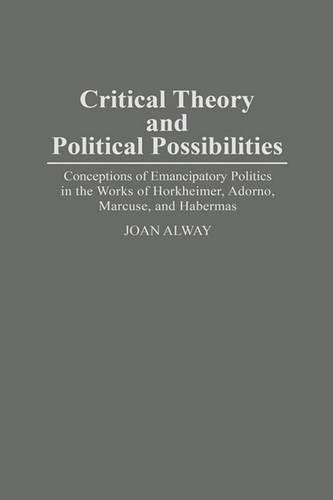
Critical Theory and Political Possibilities: Conceptions of Emancipatory Politics in the Works of Horkheimer, Adorno, Marcuse, and Habermas
(Hardback)
Publishing Details
Critical Theory and Political Possibilities: Conceptions of Emancipatory Politics in the Works of Horkheimer, Adorno, Marcuse, and Habermas
By (Author) Joan Alway
Bloomsbury Publishing PLC
Praeger Publishers Inc
14th February 1995
United States
Classifications
Tertiary Education
Non Fiction
320.01
Physical Properties
Hardback
184
Width 156mm, Height 235mm
454g
Description
Alway identifies and assesses new models of emancipatory politics in the Frankfurt Schools Critical Theory. She outlines the complexities of Critical Theory, and clarifies the logical connections between assumptions that inform the critical theorists' analyses of social conditions and their views on the possibilities for radical political practice. Alway examines the works of Max Horkheimer, Theodor Adorno, Herbert Marcuse, and Jurgen Habermas to argue the relevance of Critical Theory to contemporary efforts to reconceptualize radical politics. Indeed Alway argues that these theorists anticipate and point to new models of emancipatory politics. Unpacking the complexities of the critical theorists' writings and outlining them in a straightforward manner, Alway identifies the assumptions about human actors and history that inform their analyses of contemporary conditions. The explication of how these background assumptions inform their analyses then allows the author to clarify and assess the critical theorists' positions concerning the possibilities for radical social change, as well as their views on the issues and agents of such change. The author concludes that to the extent that the critical theorists abandon the notion of a revolutionary subject, their work leads us toward a new conceptualization of radical politics. The first generation of critical theorists, however, never fully extricate themselves from a subject-object framework that ultimately limits their efforts. Habermas's transposition of Critical Theory onto new foundations extricates it from the subject-object framework of the philosophy of consciousness, but also fundamentally alters accepted notions of radical politics. The first generation's reconceptualization of radical politics becomes with Habermas a radical reconceptualization of politics itself.
Reviews
.,."well informed, nuanced, charitable, and quite persuasive. Upper-division undergraduates and above."-Choice
...well informed, nuanced, charitable, and quite persuasive. Upper-division undergraduates and above.-Choice
..."well informed, nuanced, charitable, and quite persuasive. Upper-division undergraduates and above."-Choice
Author Bio
JOAN ALWAY is an Assistant Professor of Sociology at the University of Miami, and a member of the Center for Social and Critical Studies.
